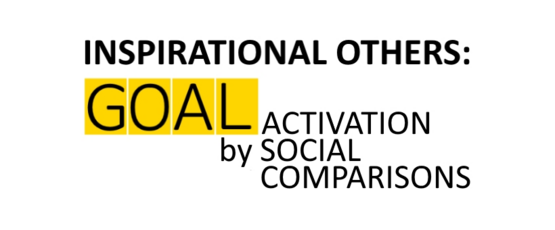Project details
Goal activation and social comparisons

We all have goals in our lives. However, we are not always acting in a way to come closer to our goals. One obstacle for goal pursuit is that a specific goal has slipped too much into the background of our mind to influence our behavior. To act on a goal, we have to think about this goal – at least unconsciously. The process, by which a goal moves from the background into the forefront of our mind, is called goal activation.
The research program “Inspirational others: Goal activation by social comparisons” aims to get a better understanding how and when other people activate goals in ourselves.
Other people are a source of information and by comparing with these people we gain an understanding of the self. Observing other people’s behavior might be inspirational and increase goal activation based on a comparison process. We aim to study how different types of comparisons – whether one searches for similarities or differences between oneself and the other - influence goal activation and goal-related behavior. Thereby it might be important, whether or not the observation of the other person makes me think about the other person’s goals.
Funding: FWF - Der Wissenschaftsfonds
Duration: February 2016 - February 2020
We tested the goal-contagion effect in several contexts (e.g., sports, prosocial behavior, earning money) and also in regard to the broader concept of “inspiration”. In none of our experiments we could demonstrate the goal-contagion effect, but we found that other external motivational factors (e.g., smartphone apps) can have an effect on specific behaviors (e.g., physical activity). We present a list of publications related to this project.
- Data and Materials on the Open Science Framework
- Brohmer, H., Eckerstorfer, L. V., van Aert, R. C. M., & Corcoran, K. (2021). Do Behavioral Observations Make People Catch the Goal? A Meta-Analysis on Goal Contagion. International Review of Social Psychology, 34(1), 3. DOI: http://doi.org/10.5334/irsp.428
- Brohmer, H. (2020). From Observation to Inspiration? Why the Goal-Contagion Effect is Overestimated. Dissertation available from https://doi.org/10.5281/zenodo.3733748
- Corcoran, K., Brohmer, H., Eckerstorfer, L. V., & Macher, S. (2020). When your goals inspire my goals: the role of effort, personal value, and inference in goal contagion. Comprehensive Results in Social Psychology, 4(1), 78-108. https://doi.org/10.1080/23743603.2020.1767502
- Kedia, G., Brohmer, H., Scholten, M., & Corcoran, K. (2019). Improving Self-Control: The Influence of Role Models on Intertemporal Choices. Frontiers in psychology, 10. https://doi.org/10.3389/fpsyg.2019.01722
- Brohmer, H., Fauler, A., Floto, C., Athenstaedt, U., Kedia, G., Eckerstorfer, L. V., & Corcoran, K. (2019). Inspired to lend a hand? Attempts to elicit prosocial behavior through goal contagion. Frontiers in psychology, 10. https://doi.org/10.3389/fpsyg.2019.00545
- Eckerstorfer, L. V., Tanzer, N. K., Vogrincic-Haselbacher, C., Kedia, G., Brohmer, H., Dinslaken, I., & Corcoran, K. (2018). Key elements of mHealth interventions to successfully increase physical activity: meta-regression. JMIR mHealth and uHealth, 6(11), e10076. https://doi.org/10.2196/10076
Contact
Mo, 4PM - 6PM
Wed, 9AM - 1PM
Thu, 8:30AM - 12:30AM

